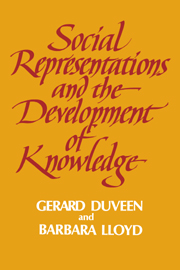Book contents
- Frontmatter
- Contents
- List of figures
- List of tables
- List of contributors
- Acknowledgements
- 1 Introduction
- 2 The underlife of the nursery school: young children's social representations of adult rules
- 3 A semiotic analysis of the development of social representations of gender
- 4 Children's representations of social relations
- 5 Social representations of childhood: an implicit theory of development
- 6 What is in an image? The structure of mothers' images of the child and their influence on conversational styles
- 7 The acquisition of reflexive social emotions: the transmission and reproduction of social control through joint action
- 8 From social cognition to social representations in the study of intelligence
- 9 Prototypes of the psychologist and professionalisation: diverging social representations of a developmental process
- 10 Social psychology and developmental psychology: extending the conversation
- Author index
- Subject index
5 - Social representations of childhood: an implicit theory of development
Published online by Cambridge University Press: 08 March 2010
- Frontmatter
- Contents
- List of figures
- List of tables
- List of contributors
- Acknowledgements
- 1 Introduction
- 2 The underlife of the nursery school: young children's social representations of adult rules
- 3 A semiotic analysis of the development of social representations of gender
- 4 Children's representations of social relations
- 5 Social representations of childhood: an implicit theory of development
- 6 What is in an image? The structure of mothers' images of the child and their influence on conversational styles
- 7 The acquisition of reflexive social emotions: the transmission and reproduction of social control through joint action
- 8 From social cognition to social representations in the study of intelligence
- 9 Prototypes of the psychologist and professionalisation: diverging social representations of a developmental process
- 10 Social psychology and developmental psychology: extending the conversation
- Author index
- Subject index
Summary
Introduction
One of the most intriguing aspects of childhood is the manner in which it is located within particular socio-historical contexts. Each culture invents, or constructs, the child as a social object in its own terms. Viewed from the perspective of its social construction our current conception of ‘childhood’ centres around the image of the ‘unfinished child’. This image is the product of a particular historical context, though one can also see signs of change and conflict in current constructions of childhood. Nevertheless, the idea of the unfinishedness of the child has long provided the basis for theories of child development. Nietzsche (1986) proposed a view of childhood as immaturity, and, more recently, Gesell (1943) suggested that the unfinishedness of the human child could be explained by the psychological complexity of human nature, which requires experience to realise its possibilities. Perfectibility, if it is conceived of as a realisation of potential, implies educability, and, consequently, a long childhood. Others, like Wallon, construe childhood as an evolutionary product which grows longer in duration with the developmental transformations of living beings. The higher up the evolutionary scale one goes, the more complex are the structures of action typical of a given species and the longer its period of childhood.
Common to all of these conceptions of childhood, however, is a view of the adult as providing the norms from which to make judgements about the child. The adult as a norm is the pivot at the centre of the social relations which necessitate the construction of the child's own normality, since the adult is also at the centre of the process of socialisation.
- Type
- Chapter
- Information
- Social Representations and the Development of Knowledge , pp. 70 - 90Publisher: Cambridge University PressPrint publication year: 1990
- 12
- Cited by



